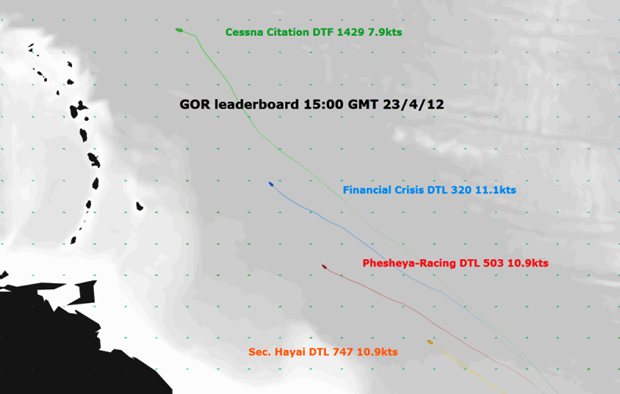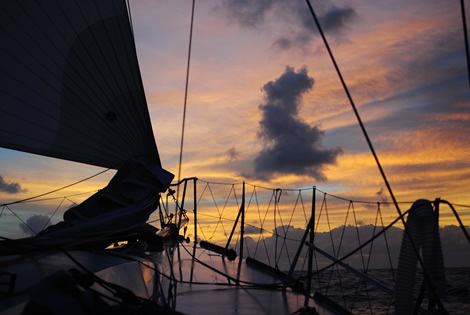Global Ocean Race: Exploding spinnakers and 30 knot squalls
The pack of three, Global Ocean Race first generation Akilaria Class40s are hammering north towards the Caribbean reporting 20-knot surfs, exploding spinnakers and 30-knot squalls as the speed averages climb and the trade wind sailing fulfils its promise.
However, for the first time in 17 days, there has been a significant dent in the expanding lead of the GOR’s frontrunner, Cessna Citation, with the chasing trio of Class40s making gains while Conrad Colman and Scott Cavanough hit lighter airs 400 miles due east of Puerto Rico as the northeast trade winds cease to perform. While distance gains or losses within the back three have been kept below ten miles over the past 24 hours, Cessna Citation has dropped 50 miles to the trio since Sunday afternoon.
Conrad Colman explains the situation: “We’ve been sailing in very different wind from the others and seemingly they’ve been reaching along happily, whilst we have been doing light, VMG running on a much more northerly course,” he reported on Monday afternoon. With GRIB files supplying conflicting data and routing options varying dramatically, the duo gybed onto port at 10:00 GMT on Monday. “This was exciting as we hadn't done a manoeuver in over a week!” says the Kiwi skipper. “We now have a whole other side of the boat to get used to; another bunk to turn into a sweaty mess and another door to use when going out to helm,” he explains. “It’s just like going on holiday! You still have the same stuff to do, like cooking dinner and making beds, but it’s in new surroundings so it feels exciting and fun!”
The hated Sargasso weed is also slowing progress for Cessna Citation: “There's still enough weed about to make us sail as if walking through a mine field,” continues Colman. “Relatively frequently we need to sock the spinnaker and round up into the wind to sail big clumps of it off the keel and the rudders,” he explains. “We've polished this manoeuver so we can get back up to full speed again in less than two minutes, so it’s an easy decision to make as the boat quickly becomes unwieldy from the turbulence on the rudders.”
While Colman and Cavanough struggled in the north, reports streamed in from Financial Crisis, Phesheya-Racing and Sec. Hayai throughout Monday as the teams became re-energised by the fast sailing.
On Sec. Hayai, the two newcomers to Class40, Erik van Vuuren and Yvonne Beusker, were astonished by their boat’s power: “What a spectacular night,” said Van Vuuren on Monday morning. “We’re curious, what are the speed limits for a Class40 without getting ‘fined’?” he questions. “Last night with our A3 spinnaker we’ve been hitting more than 19 knots, maxing at 19.2 with a TWA of 120 and wind well above the 25-range, although we can’t stand the two-knot current spoiling our party,” he reports. “The boat’s been continuously washed which supplies spectacular views, unless you’re washed yourself,” cautions Van Vuuren. “Everything is shaking inside, all quite noisy, but the boat is completely under control. It’s a steep learning curve for the Class40 rookies,” he admits.
Leading Sec. Hayai by 244 miles at 15:00 GMT on Monday, the South Africans on Phesheya-Racing are mourning the recent loss of their trusted A2: “We were surfing at speed down a big wave when the spinnaker flapped, as it often does, but this time as it refilled it disintegrated with a bang, tearing from top to bottom and all the way across!” Nick Leggatt confirmed early on Monday. “Perhaps not too surprising as it was our oldest sail, but nonetheless very disappointing and it could potentially handicap us to some extent.”
Despite sailing against 3.5 knots of current, Leggatt and Phillippa Hutton-Squire polled 10.7 knots for a three-hour period, but the breakages continued: “With the intense heat of the day, neither Phillippa nor I felt inclined to eat during the day, but we were both looking forward to a good meal in the evening,” continues Leggatt. “In preparation, I set to work washing our bowls and spoons only to have one of our spoons snap in half in my hands!” he admits with sadness. “It did seem to summarise the feeling of the day, but luckily we do have one spare spoon onboard!”
On Financial Crisis, Marco Nannini and Sergio Frattaruolo had a close call but preserved their spinnaker: “We had the big spinnaker up when we were caught by a squall and we hung on for dear life as the boat leapt off the waves surfing at nearly 20 knots in winds briefly gusting just over 30 knots,” explains Nannini. The unusually strong blast took the duo by surprise: “We were unprepared to take down the spinnaker and we just rode it out in walls of spray through the total darkness of the moonless night,” says the Italian-Slovak skipper. When the white-knuckle ride finished, the duo changed down to the medium spinnaker: “I really cannot afford to trash the big spinnaker again, so we have to be careful and preserve the materials, but we've been pretty lucky and are sailing in a band of ‘good wind’ and with a good wave pattern that lets us get up and surf easily,” adds Nannini.
At the head of the trailing pack, Financial Crisis was trailing Cessna Citation by 320 miles on Monday afternoon and averaging the best speed in the fleet at 11.1 knots. “We've been knocking down mile after mile in a relentless surf towards the Caribbean islands,” continues Nannini. “I wish we could stop for a beer! Such a shame to pass so close such beautiful places and just press on and I think the race format should include a piss-up in a few islands along the way,” he believes.
As a distraction from beer-cravings, Nannini has been studying wildlife: “I wouldn’t call myself an expert ornithologist and I can just about tell the difference between a bird and a flying fish with the latter being blue and the former white or brown or grey,” he observes. “This morning there was a carnage of flying fish on deck and their survival technique reminds me of people jumping out of burning buildings,” says Nannini. “I can appreciate the thought behind the jump, but it does help to give some thought as to the landing point and speed, but then I’ve never heard the expression ‘you're as clever as a flying fish’, although on paper it sounds damn clever for a sea creature to be able to fly.”
On Phesheya-Racing, there’s seldom any confusion with species identification: “We’ve seen another Red-billed tropic bird, Brown boobies and some enormous Portuguese men-o-war jelly fish,” Nick Leggatt logged over the weekend. “There have also been large flocks of shearwaters which, at first, we took to be Great shearwaters but closer inspection revealed that they might be the quite similar Cory's shearwater.”
Meanwhile, on Sec. Hayai, Van Vuuren and Beusker, like Nannini, are mystified by flying fish behaviour: “We’ve all had them left and right flying around us and we’ve been wondering why flying fish have evolved?” queries Van Vuuren. “It can’t be to eat insects in the middle of the sea?” he reasons.
For the Dutch team, there is no clear answer: “Maybe it’s nature’s way of saying those freeze dried meals are not worth it or, as we’ve seen, to punish Scott for whatever bad thing he has done,” Van Vuuren adds of the vicious flying fish injury sustained by Scott Cavanough on Cessna Citation. “So, as we are all competitively-minded, to get a great answer, I know I have to throw in a reward,” he suggests. “Let’s say a fresh Heineken in Charleston, for immediate consumption? So, the question for today: the purpose of flying fish? Entry is closed before mooring in Charleston!”
Whatever the reason behind the flying ability, the result onboard a racing yacht can be deeply unpleasant as Colman and Cavanough found when restacking their sails on deck after their recent gybe, revealing flying fish stuck in the folds of the sail bags: “When exposed to sun, flying fish can go down one of two routes,” says Colman. “Petrificaton, where they become little fishy fossils as hard as rock, or putrification where they dissolve into fish slime,” he explains. “Sadly, there were more that had chosen the latter course and despite many buckets of water, the sails and deck still stink like a fish market on a hot day….”
GOR leaderboard 15:00 GMT 23/4/2012:
1. Cessna Citation DTF 1429 7.9kts
2. Financial Crisis DTL 320 11.1kts
3. Phesheya-Racing DTL 503 10.9kts
4. Sec. Hayai DTL 747 10.9kts











Latest Comments
Add a comment - Members log in